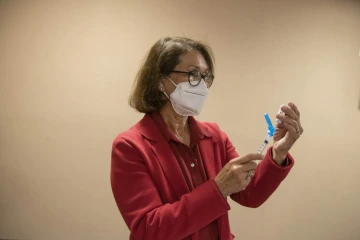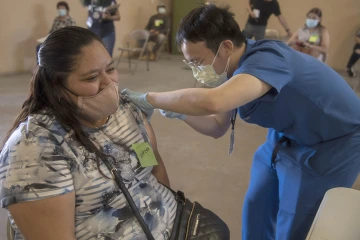MOVE UP Outreach Dispenses 36,000 COVID-19 Vaccines
A University of Arizona Health Sciences effort to reduce disparities in access to COVID-19 vaccines has hosted hundreds of mobile vaccine clinics.

Maya Sarihan, MD, then a College of Medicine – Tucson 4th year medical student, administers a COVID-19 vaccine to an agricultural laborer at the Consulate of Mexico in Douglas, Arizona, as part of a MOVE UP clinic hosted by UArizona Health Sciences.
Mobile health units like those at the University of Arizona Mel and Enid Zuckerman College of Public Health are a godsend for people in Arizona’s outlying communities. These communities often are isolated due to language, income and transportation barriers. That’s been particularly true during the COVID-19 pandemic. But thanks to the Primary Prevention Mobile Health Unit Program, more than 36,000 COVID-19 vaccines have been delivered to rural and hard-to-reach communities since February.

Cecilia Rosales, MD, MS, associate dean for community engagement and outreach at the UArizona Zuckerman College of Public Health, helps prepare vaccines at the Consulate of Mexico in Douglas, Arizona, as part of a MOVE UP clinic hosted by UArizona Health Sciences.
A new digital dashboard on the UArizona Zuckerman College of Public Health website summarizes their work as part of a UArizona Health Sciences program known as MOVE UP, or Mobile Outreach Vaccination and Education for Underserved Populations. The program operates with support from state and county health departments, UArizona Health Sciences, and staff and volunteers from each of the five Health Sciences colleges.
“We have continued to collaborate diligently with our community partners on vaccinations and basic health screenings,” said Cecilia Rosales, MD, MS, who leads the MOVE UP and Mobile Health Unit programs and is the associate dean of community engagement and outreach as well as Phoenix campus programs for the UArizona Zuckerman College of Public Health. “With this dashboard, we have found a way to highlight our work with the help of our IT folks at the College of Public Health.”
“It’s a great benefit because you come to us, to our community. It’s closer to our homes and much easier to get the vaccine and other health screenings.”Guadalupe Gonzalez, a patron of the Chicanos Por La Causa Center
Dashboard data include the number and brand of vaccines administered, as well as a demographic breakdown of recipients for each county. Nearly half of the COVID-19 vaccines that MOVE UP administered through October were delivered in Maricopa County, home to the nation’s fifth largest city, Phoenix. The county also includes large swaths of rural countryside. Almost 20,000 doses were given at U.S. Customs and Border Protection ports of entry in Douglas, Naco, Nogales and San Luis, Arizona.
Hugo and Guadalupe Gonzalez recently received their COVID-19 booster and a flu shots at the Chicanos Por La Causa Community Center west of downtown Phoenix and south of Interstate 10.
“It’s a great benefit because you come to us, to our community. It’s closer to our homes and much easier,” Guadalupe Gonzalez said.
Speaking in Spanish, Sergio Lemu, a farmworker originally from Guatemala, agreed. He received his COVID-19 vaccine at the community center in Aguila, Arizona, an agricultural town 90 miles west of Phoenix on State Road 93.
Without the mobile vaccine clinic, Lemu said, “I would have had to look around for a place to get the vaccine and it would have been very hard. The time we have is very limited, and we don’t have the transportation to get to places. We go to work very early and leave very late. Having this mobile unit service has helped us tremendously.”
On Sept. 15 in Douglas, the Mobile Health Units Program was presented the OHTLI Award by Mexican Consul Ricardo Piñeda. The award is the highest Mexican honor for individuals who have positively affected the lives of Mexican nationals in the United States and other countries.

Alvin Wong, DO, a clinical associate professor with the College of Medicine – Phoenix, administers a COVID-19 vaccine to a patient at the community center in Aguila, Arizona, a rural agricultural community west of Phoenix in Maricopa County. The clinic was part of a MOVE UP event hosted by UArizona Health Sciences.
MOVE UP and the mobile units are participating in other efforts to reduce disparities in vaccine delivery across the state, including a UArizona Center for Rural Health-led effort under the CDC-ADHS COVID-19 Disparities Initiative.
MOVE UP administered 10,338 vaccines in Santa Cruz County, with all but 357 given at the Nogales ports-of-entry.
“What they’re doing is a great thing,” said Jeff Terrell, health services director for Santa Cruz County. “It’s trying to get all the border communities across the line – particularly the hard-to-reach populations – access to vaccines.”

